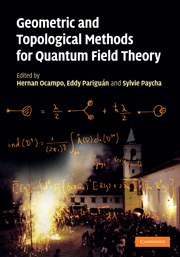Book contents
- Frontmatter
- Contents
- List of contributors
- Introduction
- 1 The impact of QFT on low-dimensional topology
- 2 Differential equations aspects of quantum cohomology
- 3 Index theory and groupoids
- 4 Renormalization Hopf algebras and combinatorial groups
- 5 BRS invariance for massive boson fields
- 6 Large-N field theories and geometry
- 7 Functional renormalization group equations, asymptotic safety, and quantum Einstein gravity
- 8 When is a differentiable manifold the boundary of an orbifold?
- 9 Canonical group quantization, rotation generators, and quantum indistinguishability
- 10 Conserved currents in Kähler manifolds
- 11 A symmetrized canonical determinant on odd-class pseudodifferential operators
- 12 Some remarks about cosymplectic metrics on maximal flag manifolds
- 13 Heisenberg modules over real multiplication noncommutative tori and related algebraic structures
3 - Index theory and groupoids
Published online by Cambridge University Press: 07 September 2010
- Frontmatter
- Contents
- List of contributors
- Introduction
- 1 The impact of QFT on low-dimensional topology
- 2 Differential equations aspects of quantum cohomology
- 3 Index theory and groupoids
- 4 Renormalization Hopf algebras and combinatorial groups
- 5 BRS invariance for massive boson fields
- 6 Large-N field theories and geometry
- 7 Functional renormalization group equations, asymptotic safety, and quantum Einstein gravity
- 8 When is a differentiable manifold the boundary of an orbifold?
- 9 Canonical group quantization, rotation generators, and quantum indistinguishability
- 10 Conserved currents in Kähler manifolds
- 11 A symmetrized canonical determinant on odd-class pseudodifferential operators
- 12 Some remarks about cosymplectic metrics on maximal flag manifolds
- 13 Heisenberg modules over real multiplication noncommutative tori and related algebraic structures
Summary
Abstract
This chapter is mainly devoted to a proof, using groupoids and KK-theory, of Atiyah and Singer's index theorem on compact smooth manifolds. We first present an elementary introduction to groupoids, C*-algebras, KK-theory and pseudodifferential calculus on groupoids. We then show how the point of view adopted here generalizes to the case of conical pseudomanifolds.
Introduction
This chapter is meant to give the tools involved in our approach to index theory for singular spaces. The global framework adopted here is noncommutative geometry, with a particular focus on groupoids, C*-algebras and bivariant K-theory.
The idea of using C*-algebras to study spaces may be understood with the help of the Gelfand theorem, which asserts that Hausdorff locally compact spaces are in one-to-one correspondence with commutative C*-algebras. A starting point in noncommutative geometry is then to think of noncommutative C*-algebras as corresponding to a wider class of spaces, more singular than Hausdorff locally compact spaces. As a first consequence, given a geometrical or topological object which is badly behaved with respect to classical tools, noncommutative geometry suggests defining aC*-algebra encoding relevant information carried by the original object.
Refining this construction, one may try to define this C*-algebra as the C*- algebra of a groupoid [46, 47]. That is, one can try to build a groupoid directly, encoding the original object and regular enough to allow the construction of its C*-algebra. In the ideal case where the groupoid is smooth, one gets much more than a C*-algebra, which only reflects topological properties: the groupoid has a geometrical and analytical flavor enabling many applications.
Information
- Type
- Chapter
- Information
- Geometric and Topological Methods for Quantum Field Theory , pp. 86 - 158Publisher: Cambridge University PressPrint publication year: 2010
Accessibility standard: Unknown
Why this information is here
This section outlines the accessibility features of this content - including support for screen readers, full keyboard navigation and high-contrast display options. This may not be relevant for you.Accessibility Information
- 7
- Cited by
